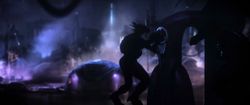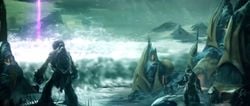Unggoy Rebellion: Difference between revisions
From Halopedia, the Halo wiki
(Undo revision 1199975 by 2.123.238.140 (talk)) |
|||
| Line 35: | Line 35: | ||
==Aftermath== | ==Aftermath== | ||
[[File:H2A Terminals - UR Arbiter 3.jpg|thumb|250px|left|The Unggoy submit to the Arbiter.]] | [[File:H2A Terminals - UR Arbiter 3.jpg|thumb|250px|left|The Unggoy submit to the Arbiter.]] | ||
The end of the Unggoy Rebellion ushered in the [[Ages of Doubt|23rd Age of Doubt]]. The war showed that when properly motivated, the [[Unggoy]] could be vicious, determined, and competent fighters—especially in close-quarters combat. Despite the lack of individual skill, the fact of the matter was that the Unggoy had the tenacity and numbers to hurl themselves and take down the [[Sangheili]]; were it not for the [[Covenant]] threatening to [[glass]] Balaho the Unggoy would have most likely stood a viable chance as their sheer numbers would just overwhelm the other Covenant forces.<ref name="Encyclopedia"/><ref name="ch150"/> Following their warrior tradition, the Sangheili commanders who had defeated the uprising quickly forgave the surviving Unggoy fighters and awarded them for their | The end of the Unggoy Rebellion ushered in the [[Ages of Doubt|23rd Age of Doubt]]. The war showed that when properly motivated, the [[Unggoy]] could be vicious, determined, and competent fighters—especially in close-quarters combat. Despite the lack of individual skill, the fact of the matter was that the Unggoy had the tenacity and numbers to hurl themselves and take down the [[Sangheili]]; were it not for the [[Covenant]] threatening to [[glass]] Balaho the Unggoy would have most likely stood a viable chance as their sheer numbers would just overwhelm the other Covenant forces.<ref name="Encyclopedia"/><ref name="ch150"/> Following their warrior tradition, the Sangheili commanders who had defeated the uprising quickly forgave the surviving Unggoy fighters and awarded them for their courage and "warrior spirit".<ref> '''Halo Encyclopedia''', ''page 121'' (2011 edition)</ref> The Sangheili provided them with significantly better training and equipment. The Sangheili allowed the Unggoy to have access to Covenant weaponry, which the Unggoy had previously been forbidden from using. The Sangheili also integrated the Unggoy into formerly Sangheili-only units, elevating them from unarmed cannon fodder to true infantry forces. However, the war kept the Unggoy in a lowly position within the Covenant. Additionally, despite gaining many new rights, the Unggoy's representation on the High Council by the [[Ministry of Concert]] remained largely powerless.<ref> '''Halo Encyclopedia''', ''page 151'' (2011 edition)</ref> Although some [[San'Shyuum]] continued to doubt the loyalty of the Unggoy, they complied with the Sangheili's decision since the [[Writ of Union]] stated that all security matters were to be governed by the Sangheili.<ref name="Encyclopedia"/><ref name="ch150"/> | ||
The rebellion led to the dismissal of the [[Minister of Concert]], who had refused to properly investigate the Infusion Incident that led to the Unggoy Rebellion. The Minister position was succeeded by the future [[Prophet of Tolerance|High Prophet of Tolerance]], who would promote better relations between all members of the Covenant species.<ref>'''Halo: Contact Harvest''', ''page 264''</ref> | The rebellion led to the dismissal of the [[Minister of Concert]], who had refused to properly investigate the Infusion Incident that led to the Unggoy Rebellion. The Minister position was succeeded by the future [[Prophet of Tolerance|High Prophet of Tolerance]], who would promote better relations between all members of the Covenant species.<ref>'''Halo: Contact Harvest''', ''page 264''</ref> | ||
Revision as of 06:05, January 20, 2017
- "Once fully provoked, the Unggoy were merciless in their violence—lashing out at all species. Their large numbers and tenacious volatility made them a suitable challenge, even for the Elites."
- — From the record of The Punished Deeds, written by a San'Shyuum scribe[1]
The Unggoy Rebellion, also known as the Grunt Rebellion,[2] was a large-scale revolt by the Unggoy against the Covenant in 2462.[3] The Unggoy Rebellion initiated the 39th Age of Conflict and led to a radical restructuring of the Covenant military.
History
At the time of the rebellion, the Unggoy were the only species that were incorporated into the Covenant by force, rather than by faith or mutual beneficence. This led to many Unggoy being unsatisfied with their position within the Covenant.[1] The Unggoy Rebellion was initiated by the "Infusion Incident" when the growing Unggoy population on High Charity put pressure on the Kig-Yar, with whom they shared their habitats. After many years without conflict or war, the overwhelming and constantly growing Unggoy population forced many of the Kig-Yar to relocate their homes and nests. The relocation caused stress for female Kig-Yar that were going through their incubation cycles, and Kig-Yar infant mortality rose on High Charity and the birth rate declined.[4]
In an effort to exact revenge, some of the more radical Kig-Yar shipmasters poisoned the Unggoy infusion resources, recreational narcotics used in the Unggoy's portable methane supplies, on Kig-Yar-controlled vessels and in the lower districts of High Charity. This made the contaminated males sterile, escalating the conflict between the two species. An Unggoy distillers' union brought the case to the Covenant Ministry of Concert, believing the contamination of the infusion was caused by faulty atmospheric controls. Seemingly trivial in nature, the case was to be dealt with by one of the Ministry's junior staffers, Ord Casto. Casto investigated the case and uncovered the Kig-Yar's deeds. Casto brought his evidence before the Minister of Concert and recommended stiff penalties for all Kig-Yar involved. However, the matter was dismissed by the Minister, who was willing to accept several thousand sterile Unggoy and did not wish to upset the entire Kig-Yar race. The offending Kig-Yar were not imprisoned and the shipmasters were simply fined for damages. After the Ministry of Concert repaired and assessed the Kig-Yar vessels, they were brought back into service. Ord Casto, feeling that the case was not properly solved, submitted a formal complaint to the Ministry. The Minister ignored the complaint, citing that the Unggoy would quickly recuperate their losses and threatened to impede the progress of Casto's political career.[4]
The case eventually escalated and became the largest of many smaller grievances that the Unggoy faced in their service with the Covenant.[4] Outraged at the case's results and its lack of attention, the Unggoy began to attack, not only the Kig-Yar but, all other races in the Covenant. Conflict spread throughout the lower districts of High Charity, as Sangheili and Kig-Yar forces attempted to quell the Unggoy Rebellion. However, the species' large numbers and tenacious behavior made the Unggoy very difficult to defeat. The rebellion forced the Hierarchs of the Covenant High Council to instate an Arbiter. This Arbiter made the decision to glass the Unggoy homeworld, Balaho, with a Covenant fleet. The Unggoy within the lower districts of High Charity were forced to watch as CAS-class assault carriers began to glass Unggoy tribes on the planet. Horrified at the turn of events, the Unggoy surrendered. The Covenant fleet ended the glassing, leaving Balaho largely intact.[1][4] Although the Unggoy cared little for Balaho itself, they were unwilling to lose the large amounts of potential breeding partners on the planet.[5] The Arbiter returned to High Charity and the surviving Unggoy in the holy city were absolved from their acts during the rebellion.[1][4]
Aftermath
The end of the Unggoy Rebellion ushered in the 23rd Age of Doubt. The war showed that when properly motivated, the Unggoy could be vicious, determined, and competent fighters—especially in close-quarters combat. Despite the lack of individual skill, the fact of the matter was that the Unggoy had the tenacity and numbers to hurl themselves and take down the Sangheili; were it not for the Covenant threatening to glass Balaho the Unggoy would have most likely stood a viable chance as their sheer numbers would just overwhelm the other Covenant forces.[3][4] Following their warrior tradition, the Sangheili commanders who had defeated the uprising quickly forgave the surviving Unggoy fighters and awarded them for their courage and "warrior spirit".[6] The Sangheili provided them with significantly better training and equipment. The Sangheili allowed the Unggoy to have access to Covenant weaponry, which the Unggoy had previously been forbidden from using. The Sangheili also integrated the Unggoy into formerly Sangheili-only units, elevating them from unarmed cannon fodder to true infantry forces. However, the war kept the Unggoy in a lowly position within the Covenant. Additionally, despite gaining many new rights, the Unggoy's representation on the High Council by the Ministry of Concert remained largely powerless.[7] Although some San'Shyuum continued to doubt the loyalty of the Unggoy, they complied with the Sangheili's decision since the Writ of Union stated that all security matters were to be governed by the Sangheili.[3][4]
The rebellion led to the dismissal of the Minister of Concert, who had refused to properly investigate the Infusion Incident that led to the Unggoy Rebellion. The Minister position was succeeded by the future High Prophet of Tolerance, who would promote better relations between all members of the Covenant species.[8]
Gallery
List of appearances
- Halo 2 (First mentioned)
- Halo: Contact Harvest (Mentioned only)
- Halo: Combat Evolved Anniversary (Mentioned only)
- Halo: The Thursday War (Indirect mention)
- Halo: Broken Circle (Mentioned only)
- Halo 2: Anniversary (Mentioned only)
- Terminals (First appearance)
Sources
- ^ a b c d Halo 2: Anniversary, Terminal 10
- ^ Halo 2, campaign level The Arbiter
- ^ a b c Cite error: Invalid
<ref>tag; no text was provided for refs namedEncyclopedia - ^ a b c d e f g Halo: Contact Harvest, pages 150-152
- ^ Halo Encyclopedia, page 308 (2011 edition)
- ^ Halo Encyclopedia, page 121 (2011 edition)
- ^ Halo Encyclopedia, page 151 (2011 edition)
- ^ Halo: Contact Harvest, page 264
See also





